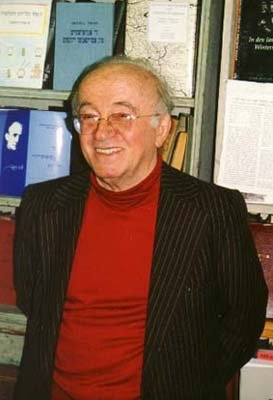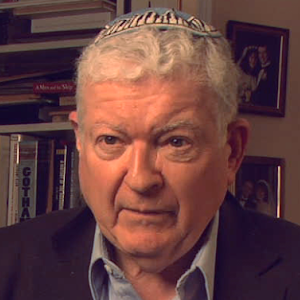Itsye Mordkhe Shekhter was born on December 1927, in Czernowitz, Ukraine. He descended from a secular Jewish family. Until 1940 he was a pupil in a Romanian school and high school. He studied Torah and writing Yiddish privately. In 1944 he left for Bucharest, completed his baccalaureate in Shots (Suceava), and studied geography at the University of Bucharest. He studied Yiddish philology (1945-1946) with Khayim Gininger. He spent 1947-1951 at the Viennese displaced persons’ camp of Arzberger. During this period, he worked for the YIVO Institute for Jewish Research, as a zamler, or collector, for the YIVO Archives. He studied comparative linguistics at the University of Vienna, where in 1951 he received his doctoral degree: Aktionen im Jiddischen, ein sprachwissenschaftlicher Beitrag zur Bedeutungslehre des Verbums (Actions in Yiddish, a linguistic contribution to the meaning of the verb).
In 1951 Shekhter arrived in New York. After serving in military intelligence in the United States Army during the Korean War, he resumed his association with YIVO and began teaching and writing. He continued his work as a bibliographer and proofreader (1954–1956), and then, from the 1970s until 1986, he was a bibliographer, proofreader and finally editor of YIVO's Yiddishe Shprakh, a journal devoted to the pronunciation, grammar and vocabulary of Standard Yiddish. From 1981 until his retirement in 1993, he was Senior Lecturer in Yiddish Studies at Columbia University in New York. He also taught in the Weinreich Program in Yiddish Language, Literature and Culture from its beginning in 1968 until 2004; the program is a joint project of Columbia and the YIVO Institute for Jewish Research in New York, which is prominent in the study of Ashkenazic Jewry. Over the years he also taught Yiddish courses at the Jewish Theological Seminary of America, the Jewish Teachers Seminary-Herzliah and Yeshiva University, all in New York.
He helped to create several foundations to support Yiddish and Yiddish culture. In 1958 he founded the Committee for the Implementation of the Standardized Yiddish Orthography. In 1964, with two students, he founded Yugntruf (''Call to Youth''), a worldwide organization devoted to teaching Yiddish to new generations. he served as its official advisor until 1974. He was very active in helping to administer a uniform Yiddish spelling. He organized and directed (1966-1972) the Yiddish-speaking children’s club “Enge-benge” (for children ages six to fourteen) and founded the Task Force for Yiddish Terminology in 1970. in 1979 Schaechter founded the League for Yiddish, based in New York. He served as its executive director until 2004.
He debuted in print with an article in Afn shvel (At the threshold) (1948). He began writing on linguistic topics in 1951 in Yidishe shprakh (Yiddish language) in New York. He published mainly linguistic studies, but also journalism, reviews, memoirs, and folklore in: Di goldene keyt (The golden chain) in Tel Aviv; Davke (Necessarily) in Buenos Aires; Tsukunft (Future), Yivo-bleter (Pages from YIVO), Yugntruf, Almanakh yidish (Almanac Yiddish), and Yidisher folklore (Jewish folklore) in New York; among others. In the 1980s, he was associate editor of The Great Dictionary of the Yiddish Language and, from 1961 to 1972, he was associate editor of The Language and Culture Atlas of Ashkenazic Jewry.
In 1994, Shekhter received the Itzik Manger Prize, the most prestigious Yiddish literary award. His books, all in Yiddish, include Authentic Yiddish (1986), Pregnancy, Childbirth and Early Childhood: An English-Yiddish Dictionary (1991), The History of the Standardized Yiddish Spelling (1999), Yiddish II: An Intermediate and Advanced Textbook (2004), and Plant Names in Yiddish: A Handbook of Botanical Terminology (2005).
Mordkhe Schaechter died in New York in February 2007.
For the list of his publications.
Sources:
Saxon Wolfgang, 'Mordkhe Schaechter, 79, Leading Yiddish Linguist', The New York times , 16 Feb 2007, p.21.






